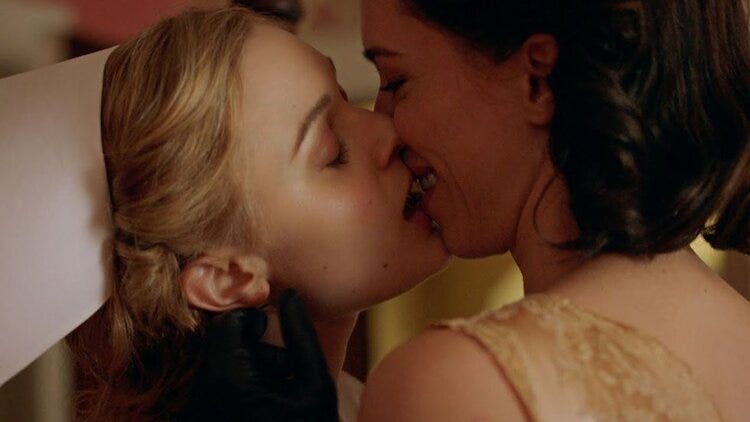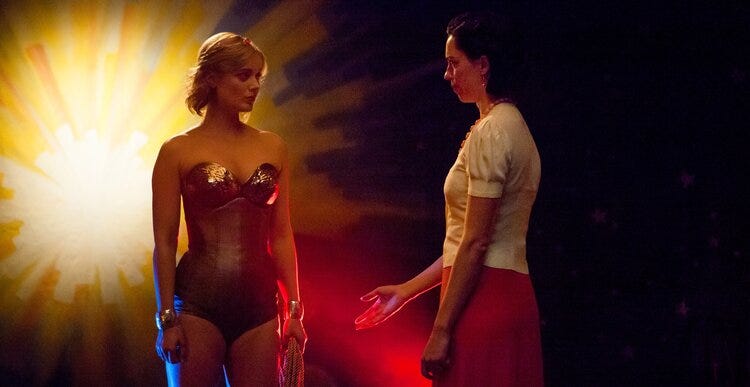Written and Directed: Angela Robinson
I read through some reviews of this intriguing film by veteran filmmaker Angela Robinson (of D.E.B.S fame, among many things) and I felt like I had watched an entirely different film to the rest of the critical universe. True, I have a strong tolerance for films where not much happens, but still, the negativity out there confuses me. This really was a fascinating study into an area of gender and sexual diversity that does not get nearly enough cultural airplay - the much-misunderstood world of polyamory.
I hadn’t seen a truly interesting poly relationship on film or TV ever, and suddenly I saw two in very short order (this and the Netflix romcom You Me Her). Robinson has dug deep to get to the core of this unconventional relationship.
William Moulton Marston’s life had twists that were made in narrative heaven. He co-invented an early version of the lie-detector, he was the creator of Wonder Woman, and she was based on the relationship he had with his wives. One of the reasons I found this film so fascinating was because even though the title suggests otherwise, it focused almost solely on the lives of the women. Marston was interesting, to a point. However, it was the women standing beside him who were truly revelatory. They loved him deeply, all the while exploring a deep love of their own. That was the story that was magical to spend time in.
Marston (Luke Evans) and his wife Elizabeth (Rebecca Hall) were already successful Harvard Psychology researchers by the time they met Olive (Bella Heathcote). She was a Radcliffe grad student who at first served as a kind of secretary for them, and gradually became their mutual lover. Initially, Olive seemed to lack power, but she fights for her rights within the relationship in quiet ways, and brings such joy to the Marstons that they quickly realise that they don’t want to live their lives without her.
Elizabeth and Olive enjoy different levels of relationship throughout the film. They each struggled with power dynamics, with jealousy, with being women in a non-conventional relationship. They had separate desires for children. They both wanted to be taken seriously. Plus, they had to learn to understand their sexual desire for each other. The chemistry between Hall and Heathcote crackles with intensity, and serves to both bring them forcefully together and threatens to tear them apart.
Throughout the years the threesome also discover a love for bondage and S&M (another are mainstream film loves to ignore). It is something that comes more easily to Olive than it does to Elizabeth. The roleplaying they embrace eventually becomes the inspiration for Marston’s most famous creation - a comic book about a “wonder woman” in red, white and blue fetish wear, wielding a magical lasso that means the captive must always tell the truth. The first time we see Olive in the costume for real is a spectacular cinematic moment.
Perhaps inevitably, given the conflicts between the two women, the dynamics in their home break down, and Olive is forced to leave in an effort to live her own life. It kills her to go, she loves her partners deeply, but because she is the submissive in the relationship she feels she’s losing her identity within the Marston’s walls.
William goes to great lengths to try and get her to stay. Elizabeth at first believes Olive leaving is a good thing, that she and William can return to a semblance of a “normal” life. However, surprising even herself, Elizabeth realises that the last thing she ever wanted was normality. She grows to understand her powerful love and need for Olive, and sacrifices her own dominance for a chance to bring her wife home.
If Professor Marston and the Wonder Women suffers from anything, it’s a reasonably pedestrian filmmaking style. Robinson is taking immense risks with her subject matter here, so she has made many decisions that steer this film into mainstream biopic territory. Still, perhaps the cinematic genius here is in making a life that is so alien to most people feel so normal. Their “meet-cute” is pretty normal, so is their courtship, their desire to have a home and family. It’s all so incredibly familiar… and yet it isn’t.
Perhaps it is confronting enough for middle America to see so many risque things presented at once. Robinson does not, for instance, hold back at all on the heat in the lover’s sex lives. This is a sexy film, with many eye-opening, joyfully sensual scenes, between all of them. There’s no doubt this film fulfills everything needed to be considered queer cinema.
Coming as it did just four months after the blockbuster opening of the DC Wonder Woman reboot with Gal Gadot, interest in Wonder Woman the character couldn’t possibly have been higher. Still, the film suffered at the box office. While I enjoyed watching Gadot bring my favourite comic book character so fully to life, I rather loved this quiet, sensitive film about her true origin story, and I applaud these wonderful people, who lived a difficult life, loving each other to the end against impossible odds. So normal, and yet so not.






